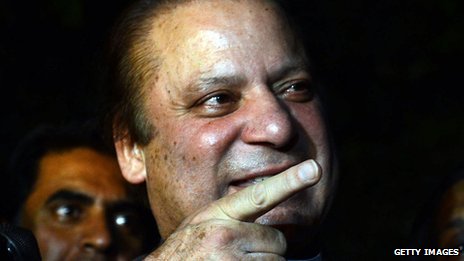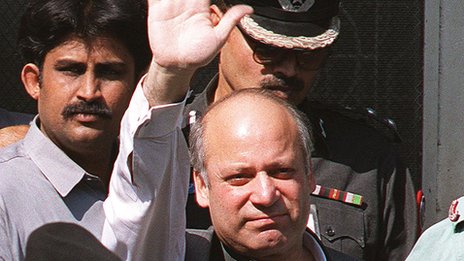Indian Prime Minister Manmohan Singh has congratulated Nawaz Sharif on his election win in Pakistan, saying it was a significant victory for democracy in the country.
Mr. Singh said the Indian people had watched the voting process with admiration and added that he looked forward to working with Mr. Sharif and his government to chart a new course and pursue a new destiny in the relations between our countries. He also invited the Pakistani leader to visit India at a mutually convenient time.
I am writing to extend to you my heartiest congratulations on your emphatic victory in the general elections in Pakistan. You have received a strong mandate to lead Pakistan towards a stable, peaceful and prosperous future, Mr. Singh said in his letter to Mr. Sharif on Sunday.
Mr. Sharif secured a larger-than-expected victory Saturday, with his Pakistan Muslim League-N party ousting Asif Ali Zardaris Pakistan Peoples Party. Despite the threat of violence, it was one of the highest voter turnouts in Pakistans history, at about 60%, and marks the first time since the country was established in 1947 that one democratically elected government has succeeded another.
Mr. Sharif, 63 years old, served two terms as prime minister in the 1990s. He was in power when army chief Pervez Musharraf who overthrew him backed military operations against Indian troops in Kargil, in the disputed Himalayan region of Kashmir. Mr. Sharif also oversaw a nuclear weapons test in May 1998. India had tested a nuclear device earlier that month.
Mr. Sharif has spoken of improving ties with India, including in trade and travel. One of his top priorities is reviving Pakistans economy, which has grown 3% a year over the past five years.
Relations between India and Pakistan are invariably fraught. The neighbors have fought three major wars since 1947 and strains often surface, most recently over the deaths of two prisoners. Sarabjit Singh, a convicted Indian spy, died after he was attacked in a Lahore jail. A day after his death, a Pakistani inmate called Sanaullah Ranjay was assaulted in prison in the northern Indian city of Jammu. He died on May 5.
In his letter Sunday, Indias prime minister said he welcomed Mr. Sharifs commitment to a relationship between India and Pakistan that is defined by peace, friendship and cooperation.
My wife joins me in extending to you and Begum Saheba [Mr. Sharifs spouse] our best wishes. With warm regards, the letter concludes.
Mr. Singh said the Indian people had watched the voting process with admiration and added that he looked forward to working with Mr. Sharif and his government to chart a new course and pursue a new destiny in the relations between our countries. He also invited the Pakistani leader to visit India at a mutually convenient time.
I am writing to extend to you my heartiest congratulations on your emphatic victory in the general elections in Pakistan. You have received a strong mandate to lead Pakistan towards a stable, peaceful and prosperous future, Mr. Singh said in his letter to Mr. Sharif on Sunday.
Mr. Sharif secured a larger-than-expected victory Saturday, with his Pakistan Muslim League-N party ousting Asif Ali Zardaris Pakistan Peoples Party. Despite the threat of violence, it was one of the highest voter turnouts in Pakistans history, at about 60%, and marks the first time since the country was established in 1947 that one democratically elected government has succeeded another.
Mr. Sharif, 63 years old, served two terms as prime minister in the 1990s. He was in power when army chief Pervez Musharraf who overthrew him backed military operations against Indian troops in Kargil, in the disputed Himalayan region of Kashmir. Mr. Sharif also oversaw a nuclear weapons test in May 1998. India had tested a nuclear device earlier that month.
Mr. Sharif has spoken of improving ties with India, including in trade and travel. One of his top priorities is reviving Pakistans economy, which has grown 3% a year over the past five years.
Relations between India and Pakistan are invariably fraught. The neighbors have fought three major wars since 1947 and strains often surface, most recently over the deaths of two prisoners. Sarabjit Singh, a convicted Indian spy, died after he was attacked in a Lahore jail. A day after his death, a Pakistani inmate called Sanaullah Ranjay was assaulted in prison in the northern Indian city of Jammu. He died on May 5.
In his letter Sunday, Indias prime minister said he welcomed Mr. Sharifs commitment to a relationship between India and Pakistan that is defined by peace, friendship and cooperation.
My wife joins me in extending to you and Begum Saheba [Mr. Sharifs spouse] our best wishes. With warm regards, the letter concludes.




